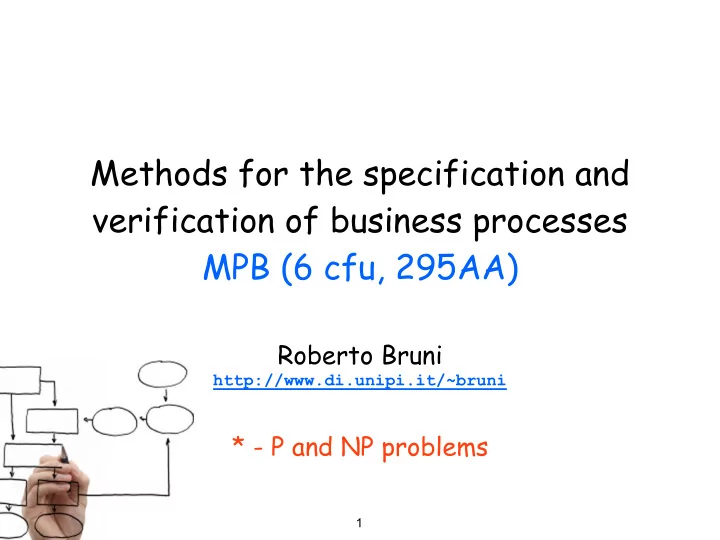

Methods for the specification and verification of business processes MPB (6 cfu, 295AA) Roberto Bruni http://www.di.unipi.it/~bruni * - P and NP problems 1
Computational Complexity Theory Computability theory studies the existence of algorithms that can solve a class of problems For example, no algorithm exists that can be used to decide in a finite amount of time if any C (or Java) program terminates or diverges (on a given input) Computational complexity theory deals with the resources needed to solve a solvable problem For example, how many steps (time) or memory (space) it takes to solve a problem 2
Decision problem A problem defines a set of related questions, each of finite length A problem instance is one such question For example, the factorization problem is: “given an integer n, return all its prime factors” An instance of the factorization problem is: “return all prime factors of 18” A decision problem requires just a boolean answer For example: “given a number n, is n prime?” And an instance: “is 18 prime?” 3
P The complexity class P is the set of decision problems that can be solved by a deterministic (Turing) machine in a P olynomial number of steps (time) w.r.t. input size Problems in P can be (checked and) solved effectively 4
NP The complexity class NP is the set of decision problems that can be solved by a N on-deterministic (Turing) machine in a P olynomial number of steps (time) Equivalently NP is the set of decision problems whose solutions can be checked by a deterministic (Turing) machine in a polynomial number of steps (time) Solutions of problems in NP can be checked effectively 5
P vs NP The question of whether P is the same set as NP is the most important open question in computer science Intuitively, it is much harder to solve a problem than to check the correctness of a solution A fact supported by our daily experience, which leads us to conjecture P ≠ NP What if “solving” is not really harder than “checking”? what if P = NP ? 6
NP-completeness A problem Q in NP is NP-complete if every other problem in NP can be reduced to Q (in polynomial time) (finding an effective way to solve such a problem Q would allow to solve effectively any other problem in NP ) 7
Eulerian circuit problem (P) Given a graph G, is it possible to draw an Eulerian circuit over it? (i.e. a circuit that traverses each edge exactly once) We have seen that it is the same problem as: Given a graph G, is the degree of each vertex even? The problem can be solved effectively! 8
Hamiltonian circuit problem (NP-complete) Given a graph G, is it possible to draw an Hamiltonian circuit over it? (i.e. a circuit that visits each vertex exactly once) The problem can be checked effectively! 9
Hamiltonian circuit problem (NP-complete) Given a graph G, is it possible to draw an Hamiltonian circuit over it? (i.e. a circuit that visits each vertex exactly once) The problem looks difficult to solve 10
Hamiltonian circuit problem (NP-complete) Given a graph G, is it possible to draw an Hamiltonian circuit over it? (i.e. a circuit that visits each vertex exactly once) The problem looks difficult to solve 11
Hamiltonian circuit problem (NP-complete) Given a graph G, is it possible to draw an Hamiltonian circuit over it? (i.e. a circuit that visits each vertex exactly once) The problem looks difficult to solve 12
Hamiltonian circuit problem (NP-complete) Given a graph G, is it possible to draw an Hamiltonian circuit over it? (i.e. a circuit that visits each vertex exactly once) The problem looks difficult to solve 13
Hamiltonian circuit problem (NP-complete) Given a graph G, is it possible to draw an Hamiltonian circuit over it? (i.e. a circuit that visits each vertex exactly once) The problem looks difficult to solve 14
Hamiltonian circuit problem (NP-complete) Given a graph G, is it possible to draw an Hamiltonian circuit over it? (i.e. a circuit that visits each vertex exactly once) The problem looks difficult to solve 15
Hamiltonian circuit problem (NP-complete) Given a graph G, is it possible to draw an Hamiltonian circuit over it? (i.e. a circuit that visits each vertex exactly once) The problem looks difficult to solve 16
Hamiltonian circuit problem (NP-complete) Given a graph G, is it possible to draw an Hamiltonian circuit over it? (i.e. a circuit that visits each vertex exactly once) The problem looks difficult to solve 17
Hamiltonian circuit problem (NP-complete) Given a graph G, is it possible to draw an Hamiltonian circuit over it? (i.e. a circuit that visits each vertex exactly once) The problem looks difficult to solve 18
Hamiltonian circuit problem (NP-complete) Given a graph G, is it possible to draw an Hamiltonian circuit over it? (i.e. a circuit that visits each vertex exactly once) The problem looks difficult to solve 19
Recommend
More recommend